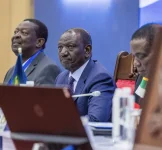President William Ruto called for an immediate cessation of hostilities in the Eastern Democratic Republic of Congo, urging warring parties to embrace dialogue during the joint East African Community and Southern African Development Community Summit in Dar es Salaam, Tanzania, on Saturday.
Ruto emphasized that military solutions would prove inadequate for the complex conflict, which stems from decades of historical, economic, and political issues transcending national borders. He specifically urged M23 rebels, who recently captured Goma, to halt their advancement and asked DRC armed forces to refrain from retaliatory actions.
The Kenyan President, who chairs the EAC, highlighted a clandestine international dimension to the conflict, warning against underestimating its destructive effects. He stressed that dialogue demonstrates collective wisdom rather than weakness, advocating for a comprehensive diplomatic approach to address root causes and secure DRC's territorial integrity.
The summit drew significant regional attendance, including Presidents Samia Suluhu Hassan of Tanzania, Emmerson Mnangagwa of Zimbabwe, Hassan Sheikh Mohamud of Somalia, Paul Kagame of Rwanda, Yoweri Museveni of Uganda, and Hakainde Hichilema of Zambia. Additional nations sent representatives at vice presidential, prime ministerial, and ministerial levels.
Ruto proposed establishing a consolidated EAC-SADC initiative backed by a robust secretariat to ensure effective implementation through coordination, monitoring, and enforcement. He called upon the international community to align their support with this regional effort, acknowledging that millions of lives depend on leaders' ability to navigate the situation with wisdom and empathy.
SADC Chairperson and Zimbabwean President Mnangagwa reinforced these sentiments, emphasizing continental unity reminiscent of anti-colonial struggles. He advocated for an approach characterized by openness, honesty, and flexibility to achieve lasting peace in the region and expressed confidence in the summit's ability to establish a viable roadmap for stability in the DRC.
The assembled leaders acknowledged the opportunity to build upon lessons learned from the Luanda and Nairobi peace processes, aiming to forge a coherent initiative toward resolving the crisis. They emphasized that DRC's security remains vital for regional prosperity and cohesion across both the EAC and SADC regions.
Ruto emphasized that military solutions would prove inadequate for the complex conflict, which stems from decades of historical, economic, and political issues transcending national borders. He specifically urged M23 rebels, who recently captured Goma, to halt their advancement and asked DRC armed forces to refrain from retaliatory actions.
The Kenyan President, who chairs the EAC, highlighted a clandestine international dimension to the conflict, warning against underestimating its destructive effects. He stressed that dialogue demonstrates collective wisdom rather than weakness, advocating for a comprehensive diplomatic approach to address root causes and secure DRC's territorial integrity.
The summit drew significant regional attendance, including Presidents Samia Suluhu Hassan of Tanzania, Emmerson Mnangagwa of Zimbabwe, Hassan Sheikh Mohamud of Somalia, Paul Kagame of Rwanda, Yoweri Museveni of Uganda, and Hakainde Hichilema of Zambia. Additional nations sent representatives at vice presidential, prime ministerial, and ministerial levels.
Ruto proposed establishing a consolidated EAC-SADC initiative backed by a robust secretariat to ensure effective implementation through coordination, monitoring, and enforcement. He called upon the international community to align their support with this regional effort, acknowledging that millions of lives depend on leaders' ability to navigate the situation with wisdom and empathy.
SADC Chairperson and Zimbabwean President Mnangagwa reinforced these sentiments, emphasizing continental unity reminiscent of anti-colonial struggles. He advocated for an approach characterized by openness, honesty, and flexibility to achieve lasting peace in the region and expressed confidence in the summit's ability to establish a viable roadmap for stability in the DRC.
The assembled leaders acknowledged the opportunity to build upon lessons learned from the Luanda and Nairobi peace processes, aiming to forge a coherent initiative toward resolving the crisis. They emphasized that DRC's security remains vital for regional prosperity and cohesion across both the EAC and SADC regions.












